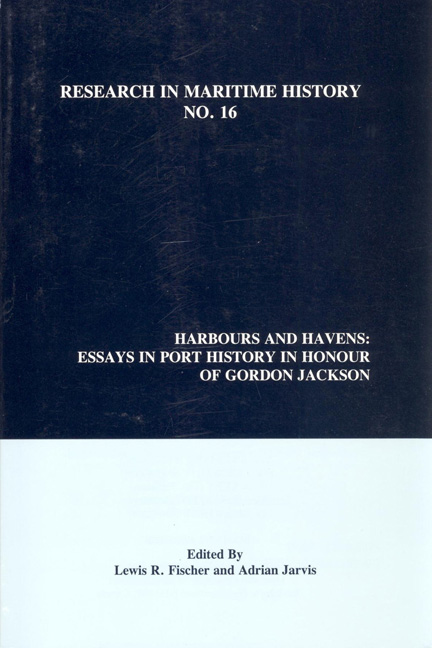Book contents
- Frontmatter
- Contents
- About the Editors
- Contributors
- Introduction
- “Gordon Jackson: An Appreciation”
- “Port History: Some Thoughts on Where it Came from and Where it Might be Going”
- “Port Politics: Interest, Faction and Port Management in Mid-Victorian Liverpool”
- “Our Little Company:' The Wilsons and North Eastern Railway Shipping Company Limited, 1906-1935”
- “The Changing Functions of a Rural Port: Dumfries, 1700-1850”
- “Australian Ports Since 1945”
- “Aspinall, Cornes and Company and the Early Development of the Port of Yokohama”
- “Dubai: From Creek to Global Port City”
- “New York's German Suburb: The Creation of the Port of Bremerhaven, 1827-1918”
- “Capital and Labour in the Port Town of Esbjerg, 1945- 1999”
- “Port Policies: Seaport Planning around the North Atlantic, 1850-1939”
- “Gordon Jackson: A Bibliography”
“Our Little Company:' The Wilsons and North Eastern Railway Shipping Company Limited, 1906-1935”
- Frontmatter
- Contents
- About the Editors
- Contributors
- Introduction
- “Gordon Jackson: An Appreciation”
- “Port History: Some Thoughts on Where it Came from and Where it Might be Going”
- “Port Politics: Interest, Faction and Port Management in Mid-Victorian Liverpool”
- “Our Little Company:' The Wilsons and North Eastern Railway Shipping Company Limited, 1906-1935”
- “The Changing Functions of a Rural Port: Dumfries, 1700-1850”
- “Australian Ports Since 1945”
- “Aspinall, Cornes and Company and the Early Development of the Port of Yokohama”
- “Dubai: From Creek to Global Port City”
- “New York's German Suburb: The Creation of the Port of Bremerhaven, 1827-1918”
- “Capital and Labour in the Port Town of Esbjerg, 1945- 1999”
- “Port Policies: Seaport Planning around the North Atlantic, 1850-1939”
- “Gordon Jackson: A Bibliography”
Summary
Gordon Jackson has identified “the need to connect trains and ships in a sensible manner” as one of the more important factors that conditioned the development and organisation of Britain's ports in the nineteenth century. Some places made this connection with more alacrity than others. While there were ports such as Grimsby and Birkenhead that were purposely built or redeveloped to facilitate the movement of cargo from railway truck to ship's hold as efficiently as possible, there were many instances of port authorities, dock owners and local government institutions adapting existing provisions to accommodate and exploit the arrival of the railway. Yet the response of some ports to the opportunities presented by the new transport mode was decidedly slow, usually as a consequence of political in-fighting between entrenched vested interests. Hull was one of these stragglers. Indeed, such was the intensity of the disputes that engulfed dock construction and railway links that Hull was poorly served in both respects until the mid-1880s - forty years after the opening of the city's first railway connection - when a consortium of port users promoted the Hull and Barnsley Railway. As Jackson observed, “while many railway companies built ports, Hull appears to have been the only port which built a major railway in self-defence.“
A further dimension to the relationship between trains and ships and ports lay in the ownership and operation of steamers by railway companies. Such integration of services was a common and logical feature of Britain's transport provisions from the 1860s, especially in ports where packet services across the English Channel and the North and Irish Seas were based. While Hull did not pioneer such enterprise, in the 1890s the North Eastern Railway Company (NER) began investing in steamship services between Hull and the “near-continental” ports, an interest that developed significantly in 1906 with the incorporation of the Wilsons and North Eastern Railway Shipping Company Limited (WNERSC). Jointly promoted with Thos. Wilson Sons and Co. Ltd. (TWSC), this was an unusual form of railway steamship enterprise in which shipping expertise and railway capital were combined in a mutually-beneficial alliance.
The WNERSC was a modest venture. Often referred to by Oswald Sanderson, chairman from its birth until his death in 1926, as “our little company,” the firm operated independently until 1935, experiencing many of the crises and rewards that marked British shipping during this era.
- Type
- Chapter
- Information
- Harbours and HavensEssays In Port History In Honour Of Gordon Jackson, pp. 63 - 88Publisher: Liverpool University PressPrint publication year: 1998

